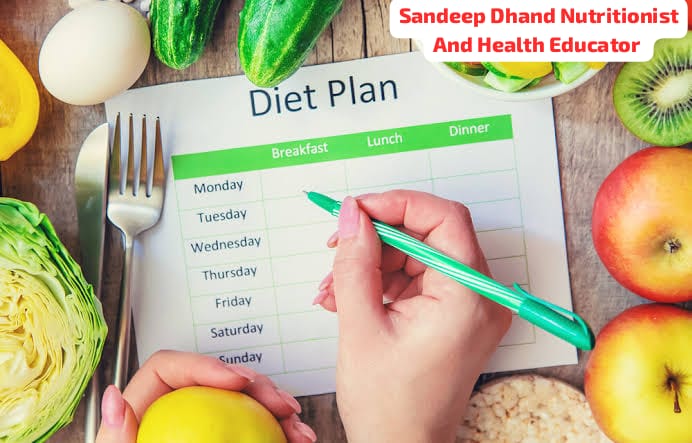Sandeep Dhand
Nutritionist And Health Educator
Anxiety and depression are common mental health issues that affect millions of people worldwide. They can impact daily life, relationships, and overall well-being. Understanding their causes, consequences, and effective treatment options, including dietary changes, can help in managing and overcoming these conditions.
What is Anxiety?

Anxiety is a feeling of fear, nervousness, or unease. It is a normal response to stress, but when it becomes excessive, persistent, or uncontrollable, it can turn into an anxiety disorder. Common symptoms include:
Constant worry or fear
Restlessness
Increased heart rate
Difficulty concentrating
Sleep problems
What is Depression?

Depression is a mood disorder that causes persistent sadness and loss of interest in activities once enjoyed. It affects emotions, thoughts, and physical health. Symptoms of depression include:
Persistent sadness
Lack of energy
Loss of appetite or overeating
Difficulty sleeping or sleeping too much
Feelings of worthlessness or guilt
Thoughts of self-harm or suicide
Causes of Anxiety and Depression

Several factors contribute to anxiety and depression. These include:
- Biological Factors:
Imbalance of brain chemicals like serotonin and dopamine
Genetic predisposition
Hormonal changes
- Psychological Factors:
Stressful life events such as job loss, relationship issues, or trauma
Negative thinking patterns
Low self-esteem
- Environmental Factors:
Exposure to violence, abuse, or neglect
Social isolation
Work or financial stress
- Lifestyle Factors:
Poor diet
Lack of physical activity
Excessive use of alcohol or drugs
Effects of Anxiety and Depression
Anxiety and depression can have serious consequences if left untreated. These include:
Physical Health Issues: Increased risk of heart disease, high blood pressure, and a weakened immune system.
Poor Work or Academic Performance: Difficulty concentrating, making decisions, and completing tasks.
Strained Relationships: Withdrawal from family and friends, leading to loneliness and social isolation.
Substance Abuse: Some people turn to alcohol or drugs as a coping mechanism.
Self-Harm and Suicide Risk: In severe cases, untreated depression can lead to suicidal thoughts or attempts.
Treatment Options
Managing anxiety and depression requires a combination of medical, psychological, and lifestyle interventions.
- Therapy and Counseling
Cognitive Behavioral Therapy (CBT): Helps change negative thought patterns and behaviors.
Psychotherapy: Talking to a professional about feelings and emotions.
Mindfulness and Meditation: Helps in reducing stress and anxiety.
- Medication
Antidepressants: Such as SSRIs (Selective Serotonin Reuptake Inhibitors) to balance brain chemicals.
Anti-anxiety Medications: Used for short-term relief but should be taken under medical supervision.
- Lifestyle Changes
Regular Exercise: Improves mood by releasing endorphins.
Adequate Sleep: Restorative sleep is crucial for mental well-being.
Avoid Alcohol and Drugs: These substances can worsen symptoms.
Engaging in Hobbies: Doing activities that bring joy and relaxation.
Diet Plan for Anxiety and Depression

Nutrition plays a crucial role in mental health. A well-balanced diet can help manage symptoms and improve overall well-being.
Foods to Include
- Omega-3 Fatty Acids (Reduce inflammation and improve brain function)
Fish (Salmon, Mackerel, Tuna)
Flaxseeds, Walnuts
- Whole Grains (Boost serotonin levels, improving mood)
Brown Rice
Oats
Whole Wheat Bread
- Fruits and Vegetables (Rich in vitamins and antioxidants that reduce stress)
Bananas (Contain tryptophan, which helps in serotonin production)
Berries (Full of antioxidants that protect brain cells)
Leafy Greens (Spinach, Kale, and Broccoli for brain health)
- Proteins (Support neurotransmitter function and energy levels)
Lean Meat, Eggs, and Dairy
Beans and Lentils
Nuts and Seeds
- Probiotic Foods (Improve gut health, which affects mood)
Yogurt
Kimchi and Sauerkraut
Kombucha
- Magnesium-Rich Foods (Help in calming nerves and muscles)
Almonds
Dark Chocolate
Avocados
Foods to Avoid
- Processed and Sugary Foods: Can lead to mood swings and energy crashes.
- Caffeine and Alcohol: Can increase anxiety and disrupt sleep.
- High-Sodium Foods: May cause dehydration and impact mood negatively.
Conclusion
Anxiety and depression are serious conditions that require attention and care. Identifying the causes, understanding the effects, and seeking proper treatment can help individuals manage and recover. A balanced diet, regular exercise, good sleep, and positive social interactions play a vital role in mental well-being. If symptoms persist, consulting a medical professional is essential. Remember, mental health is just as important as physical health, and seeking help is a sign of strength, not weakness.



